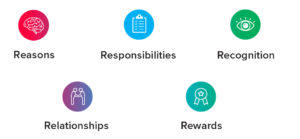Around the end of the year, most people managers start thinking about how to make their employees feel valued for the hard work they’ve put in over the past twelve months. But employee recognition isn’t just an annual activity for leaders to check off at holiday time. It’s an ongoing process.

The American Psychological Association found that 93% of employees who feel valued are motivated to do their best at work and 88% feel engaged. These metrics are in stark contrast with employees who say they don’t feel valued, where just 33% are motivated to do their best work and 38% feel engaged. Making employees feel valued is a win-win for the individual and the company.
Pay isn’t the only—or even arguably the best—way to make employees feel valued. Core Strengths has found that the sense that one’s work has purpose and that they’re an important part of the company’s mission comes from internal motivation. But it can be bolstered through a person’s primary relationships at work.
People managers can do a lot to reinforce the sense of feeling valued. You’re the person who has the most influence on your direct reports’ careers, and you can help guide them toward connecting work assignments and responsibilities with their inherent motivations and strengths. Perhaps just as importantly, when a work assignment or responsibility demands using strengths that a direct report is less comfortable with, the ability to reframe this as an opportunity to grow can help someone experience the discomfort in a much more positive manner. Growing and learning requires some discomfort, and helping a direct report see that they are developing greater capability through the use of strengths they have used less often in the past can be a highly effective way to help them feel valued when they are working on something they find challenging.
Here, we outline three ways you can make employees feel valued, starting today.
Make employees feel valued by generating a sense of self-worth.
Self-worth is about valuing yourself, but also feeling valued by others for the things you want to be valued for.
Let’s break that down.
Usually, we focus on the first part of that definition. Valuing yourself for who you are is an enduring internal drive, a deep understanding and sense of acceptance that’s not likely to fluctuate with good or bad days.
Self-worth arises out of a strong sense of self-awareness, when you know who you are, what you care about, what comes somewhat naturally and what doesn’t, what drives you, and what makes you tick.
This is where the second part of the definition comes in. A person with self-worth wants to be valued by others for the same things they value themselves for.
Take, for example, Holly, a top sales rep who values helping people. Her manager, Clarence, values competition and winning, and he always recognizes her for her results. When Holly told Clarence she wasn’t happy in her role, he was confused. In his eyes, she was successful and he was praising her for her success. But for Holly, all of his analogies about being a championship team didn’t resonate.
Once she explained to Clarence that she valued herself for her ability to help people, he told her about an opportunity to be a trainer, helping every sales rep in the district get better at their jobs. Now that Clarence values Holly for what she values in herself, not what he values in himself, she loves her job and is no longer at risk of leaving.
There’s room in every type of role for people with every type of value system. While sales roles tend to attract people motivated by results, people like Holly can still thrive. While caregiving roles tend to attract people motivated by helping, managers should work to make sure people motivated by strategy or performance feel valued in their role, too. You can do so by considering the five Rs.
Make employees feel valued through the five Rs.
Michael Maccoby talks about the concept of the five Rs of employee engagement in his book, The Leaders We Need. They are:

If an employee doesn’t feel valued, you can sit down with them one-on-one and take inventory of these elements. Here are some discussion questions:
Reasons: Can they connect the work they’re doing to their values?
Responsibilities: Do they know what’s expected of them?
Recognition: How do they prefer to be recognized for the recognition to be the most meaningful?
Relationships: Who are their key relationships in the organization and are any of them under strain?
Rewards: What is their preferred material expression of their value?
Often, when someone doesn’t feel valued at work, it’s because one or more of these five Rs is out of alignment, like in the example of Holly and her manager Clarence. She was getting recognized for different things than what she valued in herself.
Managers can correct this misalignment by collaborating with the employee to get all five Rs in line with their internal motivation. That may mean changing their role description, rewriting goals, recognizing them in public rather than in private (or vice versa), letting them work cross-functionally with other teams, helping them find someone to mentor, etc.
Make employees feel valued with handwritten notes.
It’s quick. It’s inexpensive. And it makes a lasting impression. The handwritten note is still untouchable when it comes to making people feel valued.
As a manager, the skill of writing meaningful thank you notes will take you far. A meaningful note expresses gratitude for something the employee did—from the lens of what matters most to them. This shows that you understand why they contributed in the way that they did, and lets them know you recognize the importance of their values.
Ask your employees about a compliment or note they’ve received that stuck with them and why. If you don’t already know what they want to be appreciated for, this exercise will give you a good idea.
Here are a few tips for writing a great note:
- Make sure it’s handwritten—not typed
- Express gratitude that they did something that was meaningful to them
- Share why their actions meant a lot to you
- Stamp it and send it to their home address
We’ve put together MVS-based thank you cards to help you get started; you can download them here.
Discover what your employees value in themselves.
The SDI 2.0 Assessment from Core Strengths is a reliable way to discover your employees’ internal motivations—and your own.
Take the assessment as a team to gain insight into their values that will drive the actions you take from this article.









